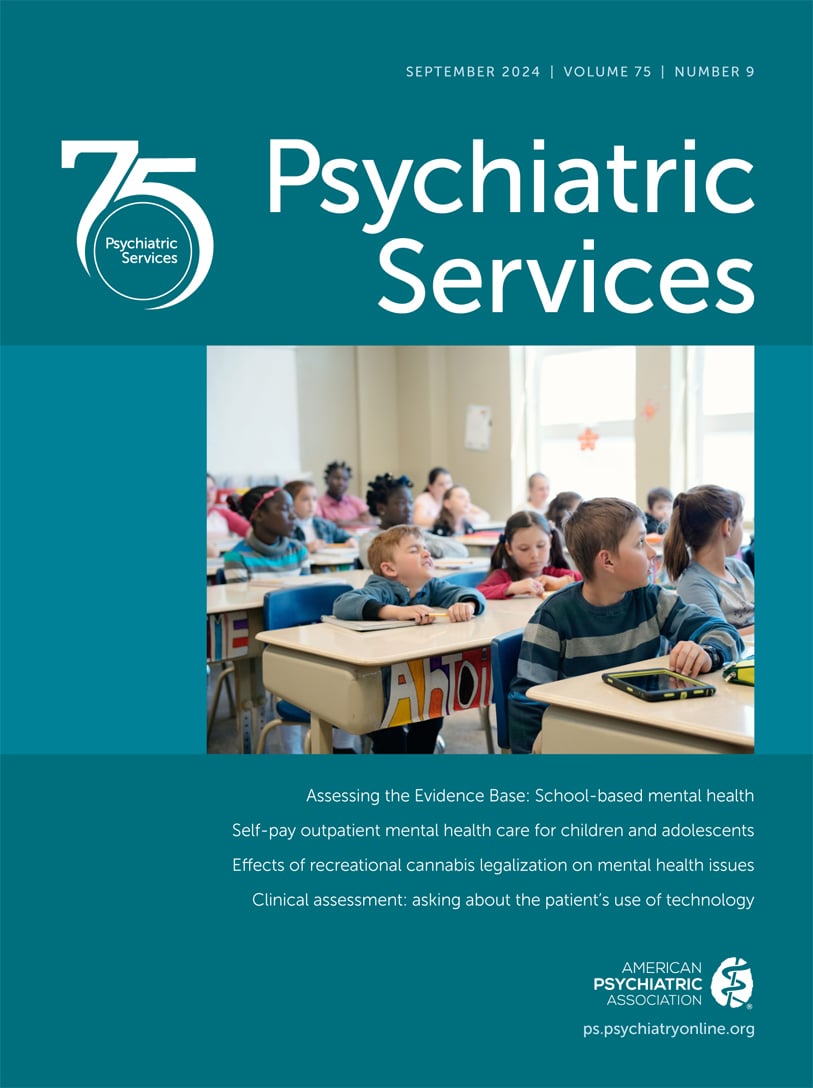Psychiatric Services
- Volume 71
- Number 6
- June 2020
Taking Issue
Editorial
Viewpoint
Articles
Publication date: 05 February 2020
Pages540–546Objective: The receipt of telemedicine for the management of mental illness, also known as telepsychiatry, is being adopted in emergency departments (EDs), but little is known about this approach. This study investigated the prevalence and applications of ...
https://doi.org/10.1176/appi.ps.201900237Publication date: 11 February 2020
Pages547–554Objective: New York City’s (NYC) Correctional Health Services has introduced specialized treatment units for patients with serious mental illness in the NYC jail system. With multidisciplinary mental health staffing and a coordinated approach with NYC’s ...
https://doi.org/10.1176/appi.ps.201900405Publication date: 21 January 2020
Pages555–561Objective: Little attention has been paid to engagement in mental health services among racially and ethnically diverse youths who identify as a sexual minority, despite research indicating that they face significant mental health disparities. In this ...
https://doi.org/10.1176/appi.ps.201900399Publication date: 10 March 2020
Pages562–569Objective: Electroconvulsive therapy (ECT) is a highly effective psychiatric treatment that remains largely underutilized. Patient psychoeducation about ECT may improve uptake of this treatment. Methods: This randomized controlled trial compared two forms of ...
https://doi.org/10.1176/appi.ps.201900448Publication date: 10 March 2020
Pages570–579Objective: Few existing instruments measure recovery-oriented organizational climate and culture. This study developed, psychometrically assessed, and validated an instrument to measure recovery climate and culture. Methods: Organizational theory and an ...
https://doi.org/10.1176/appi.ps.201900181Publication date: 02 March 2020
Pages580–587Objective: Personal recovery measures have been examined among treatment-seeking individuals enrolled in high-quality care. The authors examined whether utilization of mental health services as typically delivered is associated with personal recovery among ...
https://doi.org/10.1176/appi.ps.201900204Publication date: 02 March 2020
Pages588–592Objective: This study aimed to identify sociodemographic and health characteristics associated with use of different mental health services (medication only, counseling only, or both) among persons with depression. Methods: The analytic sample consisted of ...
https://doi.org/10.1176/appi.ps.201900223Publication date: 02 April 2020
Pages593–601Objective: This study compared health care use and costs among patients with treatment-resistant versus treatment-responsive depression across Medicaid, Medicare, and commercial payers. Methods: A retrospective cohort study was conducted by using Truven ...
https://doi.org/10.1176/appi.ps.201900398Publication date: 08 April 2020
Pages602–607Objective: This study used Social Security Administration program data to identify population-level trends in Supplemental Security Income (SSI) program participation and payments to adult recipients with autism spectrum disorder (ASD) relative to ...
https://doi.org/10.1176/appi.ps.201900265Brief Reports
Publication date: 05 February 2020
Pages608–611Objective: This study evaluated the association of the Maryland Medicaid behavioral health home (BHH) integrated care program with cancer screening. Methods: Using administrative claims data from October 2012 to September 2016, the authors measured cancer ...
https://doi.org/10.1176/appi.ps.201900299Publication date: 24 February 2020
Pages612–615Objective: The Department of Veterans Affairs and Department of Defense Mortality Data Repository (MDR) compiles National Death Index records for all veterans and military service members. This study aimed to compare MDR findings with those from a ...
https://doi.org/10.1176/appi.ps.201900324Publication date: 24 February 2020
Pages616–619Objective: Follow-up after psychiatric emergency department (ED) contact is key to optimizing outcomes for vulnerable patients. We aimed to quantify the likelihood of receiving outpatient mental health care after psychiatric ED visits in a population-level ...
https://doi.org/10.1176/appi.ps.201900466Open Forum
Publication date: 11 February 2020
Pages621–623Physician-assisted death is becoming legal in an increasing number of jurisdictions, but psychiatric patients are often explicitly excluded. However, in some countries, including the Netherlands, physician-assisted death of psychiatric patients is ...
https://doi.org/10.1176/appi.ps.201900489Publication date: 23 April 2020
Pages624–626This Open Forum focuses on specific challenges, contingency planning considerations, and downstream impacts of COVID-19 on inpatient psychiatric care. COVID-19 is a novel coronavirus that has been declared a pandemic. Challenges for inpatient psychiatry ...
https://doi.org/10.1176/appi.ps.202000166Integrated Care
Publication date: 11 February 2020
Pages627–630Evidence-based depression treatment in primary care is well established. However, clinicians are less likely to be trained to diagnose and treat anxiety disorder, which is frequently comorbid, poses an independent risk for suicidality, and complicates ...
https://doi.org/10.1176/appi.ps.201900378Research, Community, & Services Partnerships
Publication date: 02 March 2020
Pages631–634Clinical management of hoarding disorder is challenging because of the weak insight of people with hoarding disorder, the lack of available tools for disease management in the health care system, and the absence of communication between health care and ...
https://doi.org/10.1176/appi.ps.201900485Personal Accounts
Frontline Reports
Editor’s Choice
Past Issues
View Issues Archive
Vol. 75 | No. 12

Vol. 75 | No. 11

Vol. 75 | No. 10
